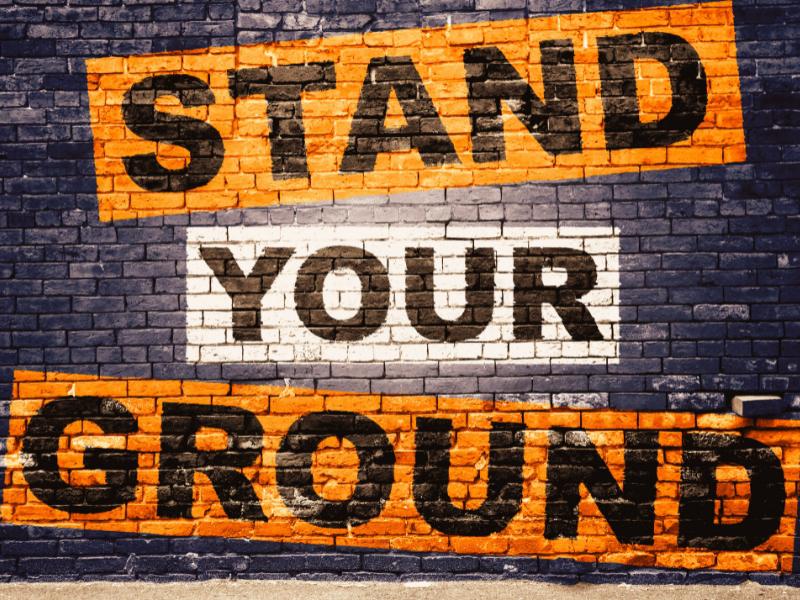
In a society that claims to value justice and equality, it isthern District of Mississippi granted that motion this summer.
Also in United States v. Harrison, 2023 WL 1771138 (W.D. Okla. Feb. 3, 2023), the court held that marijuana possession should not be prohibited defendants from possessing firearms for self-defense. See United States v. Harrison, No. CR-22-00328-PRW, 2023 WL 1771138 (W.D. Okla. Feb. 3, 2023) (holding that stripping someone of their right to possess a firearm solely because they use marijuana is not consistent with the Nation's historical tradition of firearm regulation and not a constitutionally permissible means of disarming citizens).
The Constitutional Rights of Felons: A Closer Look at Stand Your Ground Immunity
Stand Your Ground laws have sparked significant debate in recent years, with proponents arguing for the right to self-defense and opponents expressing concerns about potential abuse. However, within this contentious issue lies another question: should felons be allowed to assert Stand Your Ground immunity? This blog post aims to shed light on the constitutional rights of felons and explore the implications of denying them the ability to claim this form of immunity.
The fundamental principle at play here is that every individual, including felons, is entitled to certain constitutional rights. However, by restricting felons from asserting Stand Your Ground immunity, their right to due process and equal protection under the law may be violated. The Eighth Amendment of the United States Constitution prohibits cruel and unusual punishment, and denying felons the opportunity to protect themselves in situations of self-defense may be seen as an excessive restriction of their rights. Additionally, the Fourteenth Amendment ensures equal protection for all citizens, regardless of their criminal history. Thus, excluding felons from Stand Your Ground immunity could be seen as unequal treatment, in violation of their constitutional rights.
Understanding the Implications: Denying Felons the Right to Assert Stand Your Ground Immunity
Stand Your Ground laws have been a subject of controversial debates, especially when it comes to felons being denied the right to assert Stand Your Ground immunity. The implications of this restriction are far-reaching and raise questions about the violation of felons' constitutional rights.
First, it is important to emphasize that the presumption of innocence until proven guilty is a fundamental principle of the American legal system. Denying felons the right to assert Stand Your Ground immunity assumes guilt before a fair trial and further diminishes their chance for a fair and just legal process. By withholding this right, the justice system effectively prohibits felons from presenting evidence and arguments that could potentially exonerate them or reduce their charges. This restriction not only undermines their right to a fair trial but also denies them the opportunity to defend their lives and well-being when faced with immediate threats.
Additionally, denying felons the right to assert Stand Your Ground immunity perpetuates a cycle of inequality and restricts opportunities for rehabilitation. The ability to assert Stand Your Ground immunity is not solely about protecting oneself in a dangerous situation; it is also about affirming individuals' right to self-defense and their right to live. By disallowing felons this right, the justice system effectively communicates that their lives are worth less than those of law-abiding citizens. This further marginalizes them and inhibits their chances of successfully reintegrating into society, perpetuating a system that disproportionately affects specific communities and undermines the principles of justice and equality.
In conclusion, denying felons the right to assert Stand Your Ground immunity raises significant concerns about the violation of their constitutional rights. It undermines the presumption of innocence and denies them the opportunity to present their case before a fair trial. Additionally, it perpetuates a cycle of inequality and hinders their chances of successful rehabilitation. It is vital to assess and address the implications of these restrictions to safeguard the constitutional rights of all individuals, including felons.
The Arguments for Inclusion: The Violation of Constitutional Rights in Restricting Stand Your Ground Immunity for Felons
In the United States, the Constitution guarantees certain rights and protections to all individuals, including those who have committed felonies. However, restricting felons from asserting stand your ground immunity goes against these constitutional principles and denies them the opportunity to protect themselves in the face of danger. By denying felons the right to assert stand your ground immunity, their constitutional right to due process and equal protection under the law is being violated.
One argument for including felons in stand your ground immunity is rooted in the principle of equal protection. The Constitution guarantees that all individuals, regardless of their criminal history, are entitled to equal protection under the law. When fth Jr at 205-216-3304.